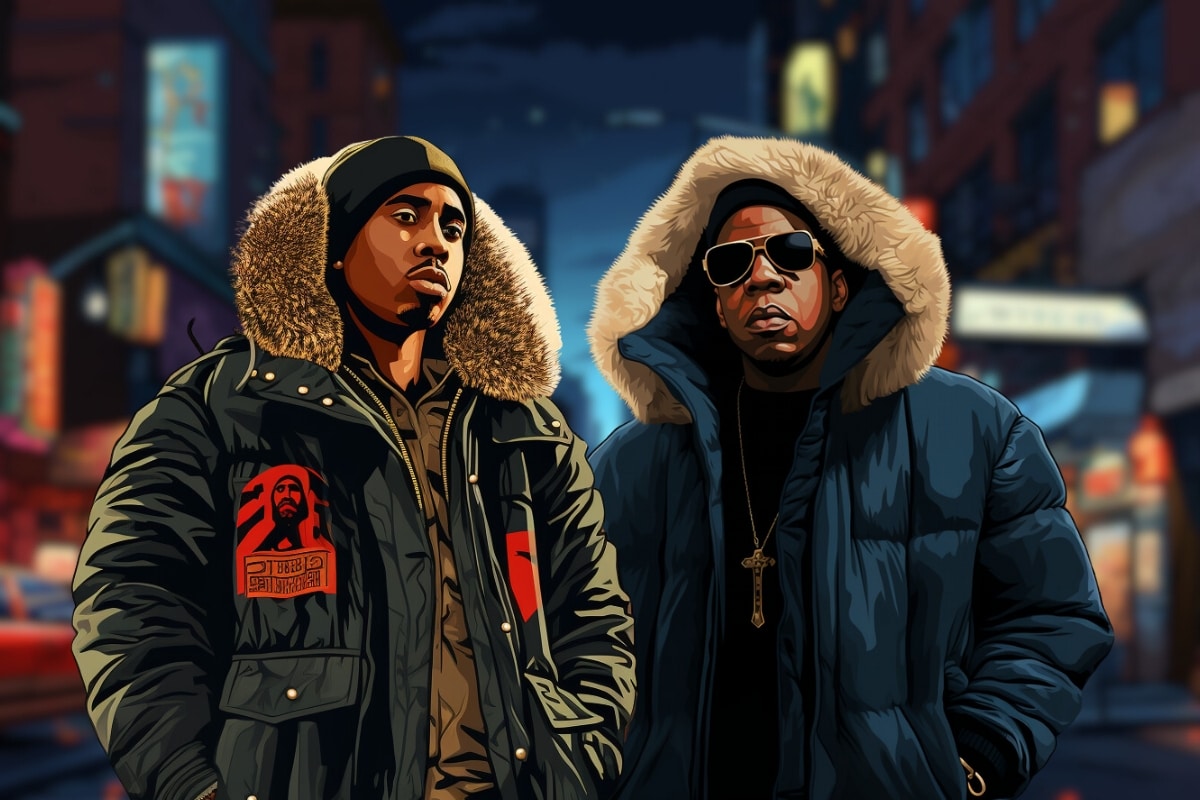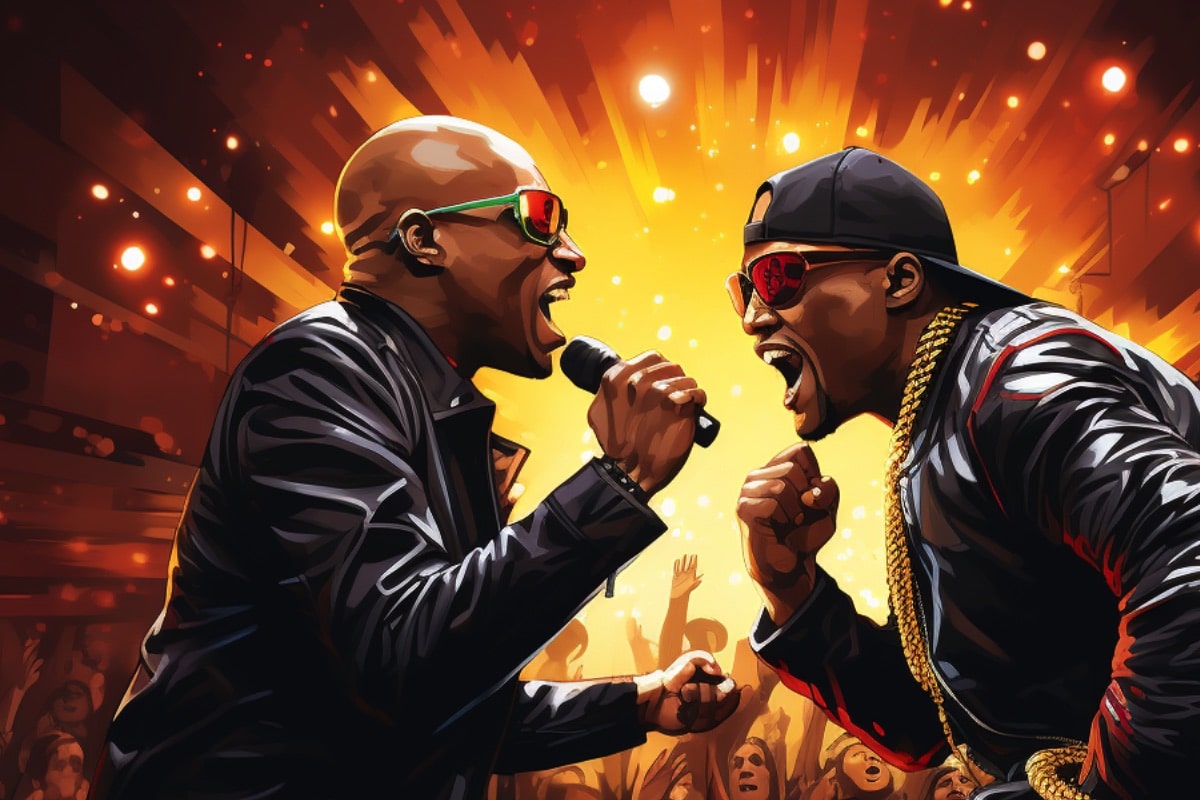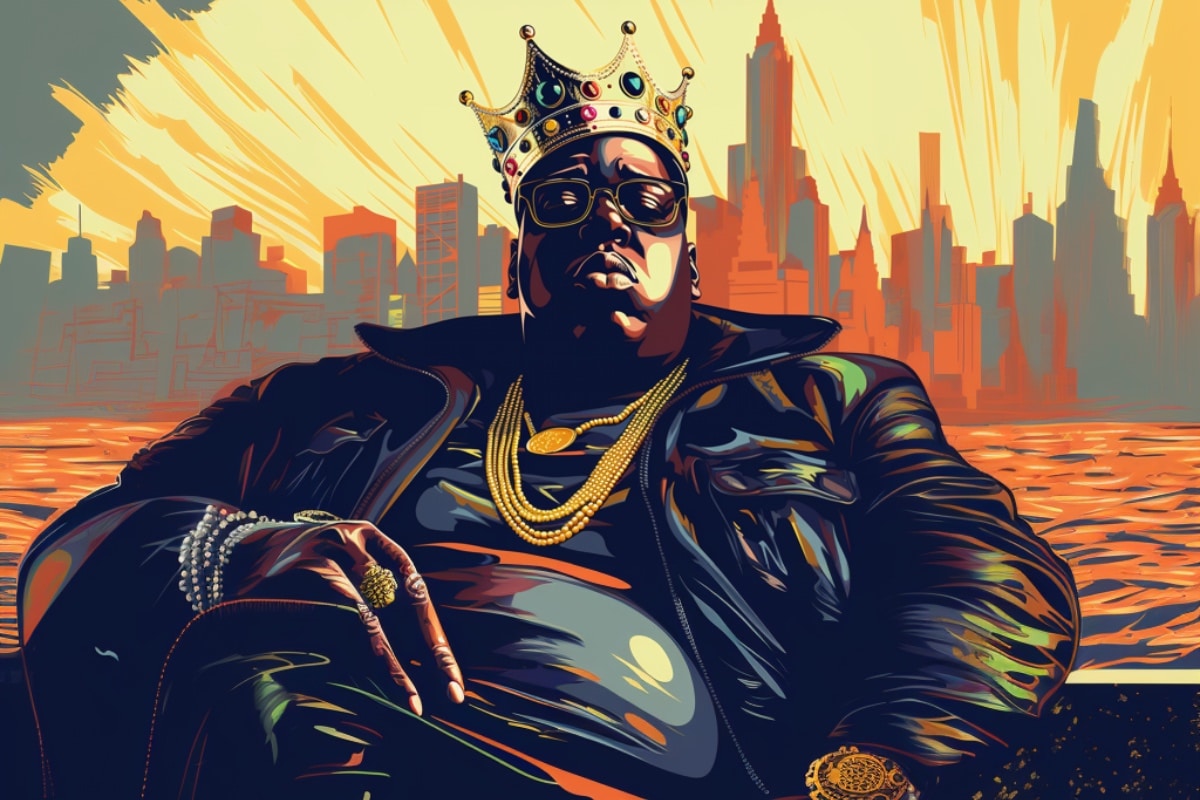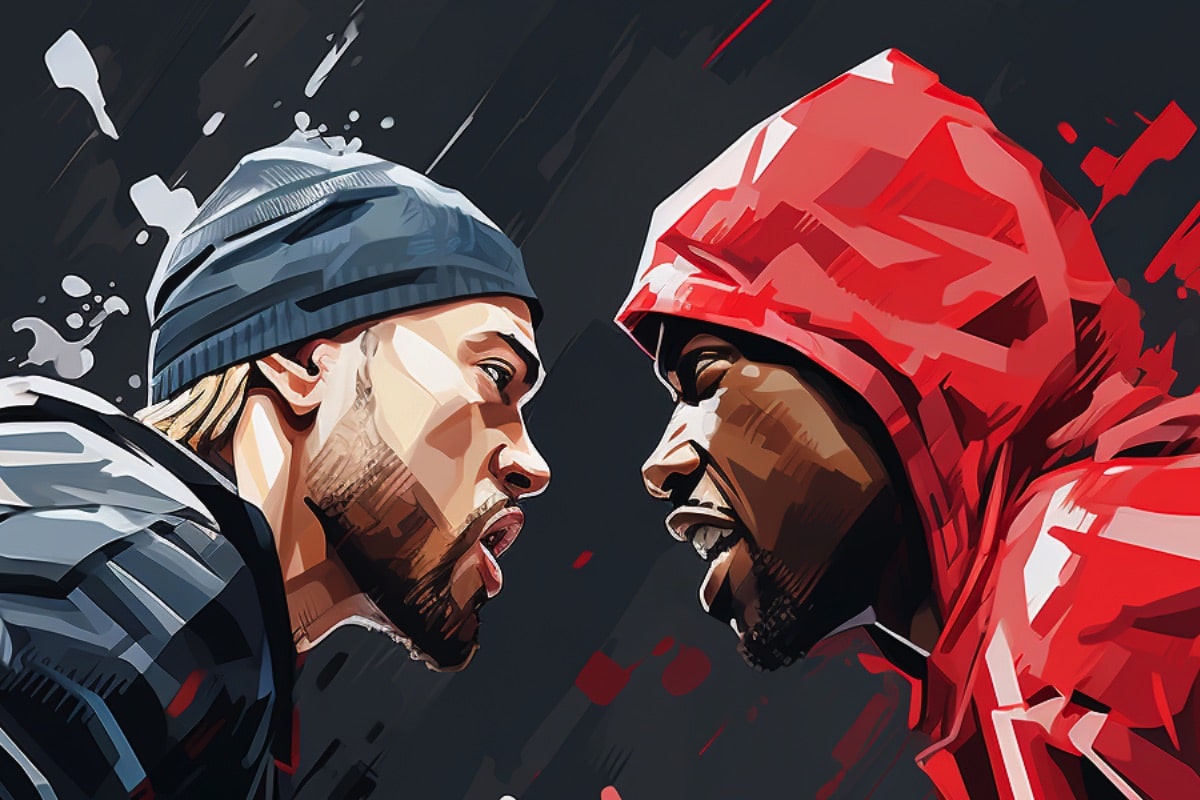Battles have been an integral part of hip-hop since the beginning. In fact, since before the beginning. Uprocking dance battles, which began in the late 1960s, were closely tied to street gang fights. Long before rappers were throwing disses back and forth, DJ battles were an integral part of life in the Bronx.
In fact, pioneering hip-hop DJ Kool Herc initially gained fame not due to his unique record-spinning techniques or choice of tunes (though they were certainly notable), but because his sound system drowned out his competitors, enabling him to win competitions. So it only makes sense that as attention shifted to the people behind the mic, battling would soon follow.
The whole idea of a modern rap battle had its genesis in 1981, when Kool Moe Dee went up against Busy Bee at the Harlem World nightclub. Moe Dee delivered a performance that won the night and, in doing so, helped move rapping from its party-rocking roots to a sophisticated, lyrical, complex art form.
The next battle to capture the public imagination was actually a series of them: the “Roxanne wars” of the mid-80s. A teenage girl named Lolita Gooden created a response in the voice of the girl UTFO dissed in their song “Roxanne Roxanne.” She took the character’s first name and her middle one, and became Roxanne Shanté. Her song inspired dozens of others, and ultimately led to an on-wax battle between her and another rapper who took up the “Roxanne Roxanne” character, the UTFO-backed The Real Roxanne.
From there, battling took off. It was a way to settle scores, for new artists to get attention (Ice-T has been very clear over the years he took on LL Cool J in the late 1980s not because of any personal animus, but simply because LL was then top dog), and for any number of other reasons. Rapping, many artists say, is a sport as much as it is an art form, and competition became a part of the fabric.
Origins of the Jay-Z vs. Nas beef
By the summer of 2001, when the Jay Z vs. Nas beef exploded into public consciousness, the format of rap battling was well-established. Battles would usually begin almost imperceptibly, with subtle, subliminal shots thrown in the middle of an otherwise unrelated song or freestyle. Then things would get hotter and heavier, until direct attacks were the order of the day. At that point, nothing was off-limits. Partners, children, friends, even chronic illnesses were all fair game.
Even with that background, Jay and Nas going at it was a very big deal. Both were rap superstars. By that point, Nas’s 1994 debut Illmatic was already regarded as the Kind of Blue of hip-hop—not just a classic, but maybe the classic album of the entire genre. He’d moved on from there to more commercial, if less critically-beloved, music. In the summer of 2001, Jay was gearing up to release his fifth album. His third, 1998’s Vol. 2… Hard Knock Life, vaulted him into hip-hop’s top tier, selling five million copies in less than two years. But what all those new fans may not have noticed was the years of subliminals that had by that point been flying back and forth between him and Nas.
By most accounts, the beef between Jay and Nas dates back to the making of Jay’s debut album Reasonable Doubt. Nas, the story goes, agreed to appear on the song “Bring It On,” but then never showed up to the studio. Perhaps in response, a different song on Jay’s album then featured a sample of Nas’s voice. Mere weeks later, the opening song on Nas’s new album It Was Written contained a line about a Lexus that even the track’s co-producer admitted was directed at Jay, who had been shouting out the cars and driving them in videos. (Nas, for his part, diplomatically says the line was “inspired by” the Marcy rapper, but was not a shot.)
Things begin heating up
Then we jump ahead a few years. Jay’s protege Memphis Bleek moved things to the next level. While on vacation in the Bahamas, Bleek heard from friends who were convinced that Nas was dissing him on the song “Nastradamus,” which appeared to reference Bleek’s recent track “What You Think of That.” Bleek fired back with “My Mind Right,” which contained an impossible-to-miss reference to It Was Written: “Your lifestyle’s written / So who you supposed to be? Play your position.”
Nas’s response would be the one that let even casual fans know that there was something going on. In a freestyle, he addressed nearly the entire roster of Jay’s Roc-a-fella Records by name (“Rip the freeway, shoot through Memphis with moneybags / Stop in Philly, order cheesesteaks and eat beans fast”) before moving on to Jay himself.
The disses were both surgical and broad. Nas recalled Jay’s fast rapping “iggity” beginnings (“You used to rap like the Fu-Schnickens”) and accused Hov of exaggerating his street bona fides (“Those times, they never took place, you liar / Un was your first court case—you had no priors”.) But, in a foreshadowing of what was to come, Nas also took time to turn the hook of Jay’s then-current single “Izzo (H.O.V.A.)” into a homophobic taunt.
Jay fired back on June 28, 2001. In front of a packed Nassau Coliseum at radio station Hot 97’s annual Summer Jam concert, he let off a vicious freestyle mostly directed at Prodigy of Mobb Deep, another rapper with whom he’d had simmering tension for years. But at the very end, he had a message for a different Queens artist. “You guys don’t want it with Hov,” he spit. “Ask Nas, he don’t want it with Hov, no!”
Showdown between the Kings of New York
Less than three months later, that freestyle would appear as the song “Takeover” on Jay’s new album The Blueprint, and appended to the Prodigy disses was a new verse aimed directly at Nas. It was absolutely devastating. It surgically broke down Nas’s life and career, from the idea that none of his subsequent LPs measured up to his debut; to bad early-career business moves; to his clothing ads; to Jay being the real-life inspiration for some of Nas’s verses.
It closed with a line that would spark the next phase of the beef—Jay winkingly said that “You-know-who did you-know-what with you-know-who,” before insisting to Nas that he should “keep that between me and you (for now).” To anyone paying attention, “Takeover” (and Jay’s lighthearted riposte to Nas’s diss of his label roster) seemed like a knockout blow. It was doubtful Nas could recover.
But recover he did. God’s Son responded that December (on Jay’s birthday, to boot) with “Ether.” The track, so named because “I was told a long time ago, ghosts and spirits don’t like the fumes from ether, and I just wanted to affect him with my weapon and get to his soul,” was so powerful that its name eventually became a verb—to “ether” your opponent meant to deliver a crushing, spirit-destroying diss.
The track was as detailed and comprehensive as “Takeover.” It began with memories of a pre-fame Jay borrowing jewelry from his mentor Jaz (in reality it was the other way around, but unlike political debates, there are no real-time fact-checks for diss songs). Then it moved on to accusations that Jay stole from other rap greats (“KRS already made an album called Blueprint”), saving particular animus for thefts from the Notorious B.I.G. Nas wasn’t just mad about borrowed lyrics—he accused Jay and Roc-a-fella Records co-founder Dame Dash of stealing their entire “cool, reserved rapper teamed with flashy, money-throwing label head” schtick directly from Big and Sean Combs. (“Is he Dame Diddy, Dame Daddy, or Dame Dummy? / Oh, I get it—you Biggie and he’s Puffy.”)
But it wasn’t just the song’s precision that got attention. It sounded angry. Nowhere was that better captured than in the childish, puerile (and, yes, sometimes homophobic) disses littered throughout. Jay is ugly. He looks like a camel (an insult suggested by DJ Premier). He has “dick-sucking lips.” Even the name of his label is a nod to his supposed sexual preference (“I rock hoes, y’all rock fellas”). Shockingly, this was the toned-down version of the song—the original, now lost to history, was even harsher.
Up until this point, volleys in the rap war were separated by weeks or months. But the pace was about to quicken. About a week after the release of “Ether,” Jay hit back with “Super Ugly.” The song took Jay’s “You-know-who…” ending to “Takeover” and made it explicit. Hov detailed his relationship with Carmen Bryan, the mother of Nas’s daughter Destiny. Jay referenced Bryan by name, joking that he and another one time boyfriend of hers, basketball star and occasional rapper Allen Iverson, “have more in common than just ballin’ and rhyming / Get it? More in Carmen.” Things only got more graphic from there, with Jay telling Nas that he “came in your Bentley backseat / Skeeted in your Jeep / Left condoms on your baby seat.”
“Super Ugly” premiered on Hot 97, and fans were polled afterwards about whether it or “Ether” was better. “Ether” won, 58% to 42%. That loss seemed to shake the normally unflappable Jay Z. He went on to apologize for “Super Ugly”’s graphic imagery, saying that even his own mother thought it went too far.
Aftermath and lingering shots
For most people, that marked the end of the battle. But stray shots continued for years afterwards. Jay hit with “Don’t You Know” and the title track of his album The Blueprint 2. Nas retaliated with “Last Real Ni**a Alive.”
Summer Jam 2002 brought new life to the dying beef. Nas was supposed to perform, and wanted to hang Jay in effigy as part of his stage show. The request was denied, so Nas pulled out of the performance and went to rival station Power 105, giving a rambling interview where he insulted several rappers and even called for Funk Flex’s chain to be stolen.
Jay responded with a Hot 97 freestyle that contained some references to the situation. He had just returned from a vacation, so it’s often referred to as the “Back from France” freestyle. “While y’all running your mouth complaining about Summer Jam / I was in flip-flops in the south of France,” he rhymed. “See how it flip-flops with the number one station for hip-hop and r&b / You thought that Summer Jam was starring you? It was starring me.” While that performance contained some of the best rapping of the entire beef, it was so far past the climax that it had little impact.
The two artists publicly made peace by appearing onstage together in October 2005, and went on to collaborate on several tracks.
Who won the battle: Jay-Z or Nas?
No matter who you think won, the beef greatly affected both artists’ careers. It got coverage everywhere, from rap mags all the way to the august New York Times. But specifically, the beef reinvigorated Nas. Stillmatic, released at the height of the battle, received the coveted “five mic” rating from The Source. After several records widely considered to be not up to the level of his debut, Nas was back on top.
As for Jay, the beef didn’t slow him down at all. He continued his hectic album-a-year pace through 2003, at which point he “retired” and, in January 2005, became the president of Def Jam. The retirement from rap didn’t last long, and Jay returned to releasing albums in 2006. But his pace slowed, though he continued touring heavily and making plenty of high-profile business deals—enough that Forbes anointed him a billionaire in 2019.
Even two-plus decades after the height of their battle, the legacy of the Jay Z/Nas clash remains strong. Nas even referenced it on his 2022 song “Thun”: “In a Range Rover, dissecting bars from ‘Takeover’ / Sometimes I text Hova like, ‘N*gga, this ain’t over’.” So it’s worth attempting to answer: who ultimately won?
Both sides got superb shots in, and both had misses. Some of the best music, such as the “Back from France” freestyle, is barely known and remains there for new generations of die-hards to discover. And yes, it’s fair, if too easy, to say that “hip-hop” and/or “the culture” are the true victors. But when you look at the impact on both artists’ careers (as well as the contemporaneous fan vote), it’s clear that Nas was the winner. Clashing with Jay reminded the hip-hop world that he was a top-tier lyricist, able to perfectly balance brains and emotion, detailed storytelling and playground insults. His current late-career renaissance is directly attributable to his first comeback, circa 2001.
Jigga, arguably the greatest rapper ever, would no doubt have continued at superstar status, battle or no battle. But for Nas, going toe-to-toe with Hov, and ultimately triumphing, put the wind back in his sails and set the stage for his current elder-statesman status. “The king is back,” he proclaimed at the beginning of “Ether.” It was a statement he made come true by the sheer power of his performance in this battle.








